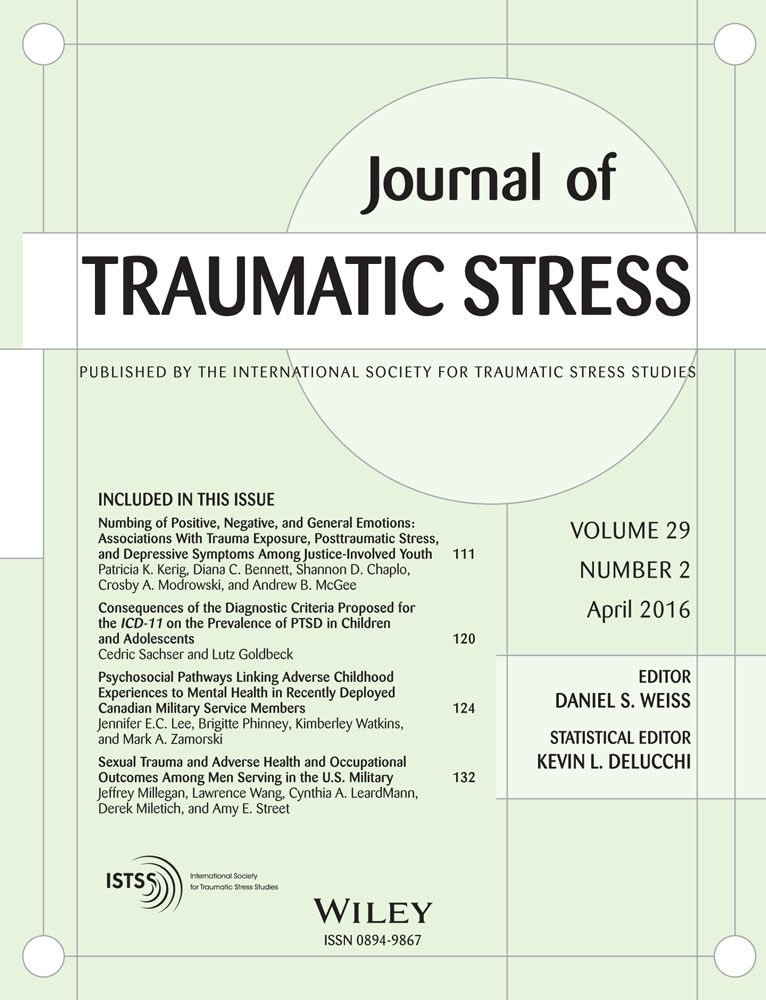Emotion Regulation in Sexually Abused Preschoolers: The Contribution of Parental Factors
This research was supported by a grant from the Social Sciences and Humanities Research Council (SSHRC). The authors would like to thank the families who participated in this study.
Abstract
enChild sexual abuse (CSA) is associated with emotion regulation deficits in childhood. Parents play a crucial role in the development of emotion regulation in their children, especially at younger ages. Close to 50% of mothers of sexually abused children report having been sexually victimized themselves as children. They are consequently at risk of experiencing significant distress following the disclosure of sexual abuse of their child. Parents' distress could interfere with their ability to provide support and to foster development of emotion regulation in their children. The aim of the present study was to explore the relationship of parental factors (history of sexual victimization in childhood and the current level of distress) to sexually abused preschoolers’ emotion regulation competencies. Emotion regulation was assessed in 153 preschoolers by their parents with the Emotion Regulation Checklist; 75 of these children were abused (14 boys); 78 were not abused (21 boys) and were part of a comparison group. Parents reported their level of distress using the Psychiatric Symptom Index. Results indicated that parental factors contributed to some dimensions of preschoolers' emotion regulation (namely displays of underregulation of emotion) above and beyond children's victimization status and gender (Cohen's ƒ2 = .15). Identifying parental distress and history of sexual victimization as positively associated with emotional dysregulation in preschool children victims of CSA has important research and clinical implications.
Resumen
esSpanish Abstracts by the Asociación Chilena de Estrés Traumático (ACET)
Regulación emocional en los preescolares abusados sexualmente: La contribución de los factores parentales
ASI, FACTORES PARENTALES Y RE
El abuso sexual infantil (ASI) se asocia con déficits in la regulación emocional en la infancia. Los padres juegan un rol crucial en el desarrollo de la regulación emocional en los niños, especialmente en edades tempranas. Cercano al 50 % de las madres de los niños abusados sexualmente reportan haber sido victimizadas sexualmente cuando niñas. Consecuentemente, ellas están en riesgo de experimentar angustia significativa después de la revelación del abuso sexual de su niño. La angustia parental puede interferir con la habilidad de proporcionar apoyo y fomentar el desarrollo de la regulación emocional en sus niños. El objetivo de este estudio fue explorar la relación de los factores parentales (historia de victimización sexual en la infancia y el nivel actual de angustia) en las competencias de regulación de las emociones en preescolares abusados sexualmente.
La regulación emocional fue evaluada en 153 preescolares por sus padres con la Escala de Regulación Emocional; 75 de estos niños fueron abusados (14 niños del sexo masculino), 78 no fueron abusados (21 niños del sexo masculino) y fueron parte de un grupo de comparación. Los padres reportaron sus niveles de angustia usando el Índice de Síntomas Psiquiátricos. Los resultados indicaron que los factores parentales contribuyen a algunas dimensiones de la regulación emocional de los preescolares (principalmente muestras de baja regulación emocional) más que el estado de victimización de los niños y el género (Cohen´s f2 = .15). La identificación de la angustia parental en los niños preescolares victimas de ASI tiene importantes consecuencias en investigación y clínica.
抽象
zhTraditional and Simplified Chinese Abstracts by AsianSTSS
Emotion Regulation in Sexually Abused Preschoolers: The Contribution of Parental Factors
Traditional Chinese
標題: 曾受性虐待學前兒童的情緒調節:家長因素的影響
撮要: 兒童性虐待(CSA)跟童年的情緒調節困難有關。家長在子女的情緒調節發展過程裡擔當重要角色, 特別在兒童小時候。曾受性虐待的兒童當中, 超過五成母親兒時亦曾受性侵犯。因此, 孩子透露曾受性虐待時, 這些母親有風險經歷顯著的悲痛。家長的悲痛有可能影響他們為孩子提供支持的能力, 並影響他們培養孩子的情緒調節發展。本研究目的為探索家長因素 (兒時受性侵犯的歷史及當前的悲痛水平) 跟曾受性虐待學前兒童的情緒調節能力的關係。研究請來153名學前兒童的家長, 利用情緒調節量表為兒童的情緒調節進行評估。當中75名兒童曾受虐(14名男孩), 78名兒童無經歷受虐(21名男孩)並參與在比較組。家長透過精神症狀指數報告自己的悲痛水平。結果顯示, 家長因素對學前兒童的情緒調節有一定影響 (即顯示出情緒調節困難) , 其影響超越兒童的受害狀況及性別因素(Cohen's ƒ2 = .15)。研究發現家長的悲痛及過往受性侵犯的歷史, 跟曾受性虐待的學前兒童情緒失調有正向關連。此發現對日後的研究和治療有重要幫助。
Simplified Chinese
标题: 曾受性虐待学前儿童的情绪调节:家长因素的影响
撮要: 儿童性虐待(CSA)跟童年的情绪调节困难有关。家长在子女的情绪调节发展过程里担当重要角色, 特别在儿童小时候。曾受性虐待的儿童当中, 超过五成母亲儿时亦曾受性侵犯。因此, 孩子透露曾受性虐待时, 这些母亲有风险经历显著的悲痛。家长的悲痛有可能影响他们为孩子提供支持的能力, 并影响他们培养孩子的情绪调节发展。本研究目的为探索家长因素 (儿时受性侵犯的历史及当前的悲痛水平) 跟曾受性虐待学前儿童的情绪调节能力的关系。研究请来153名学前儿童的家长, 利用情绪调节量表为儿童的情绪调节进行评估。当中75名儿童曾受虐(14名男孩), 78名儿童无经历受虐(21名男孩)并参与在比较组。家长透过精神症状指数报告自己的悲痛水平。结果显示, 家长因素对学前儿童的情绪调节有一定影响 (即显示出情绪调节困难) , 其影响超越儿童的受害状况及性别因素(Cohen's ƒ2 = .15)。研究发现家长的悲痛及过往受性侵犯的历史, 跟曾受性虐待的学前儿童情绪失调有正向关连。此发现对日后的研究和治疗有重要帮助。




